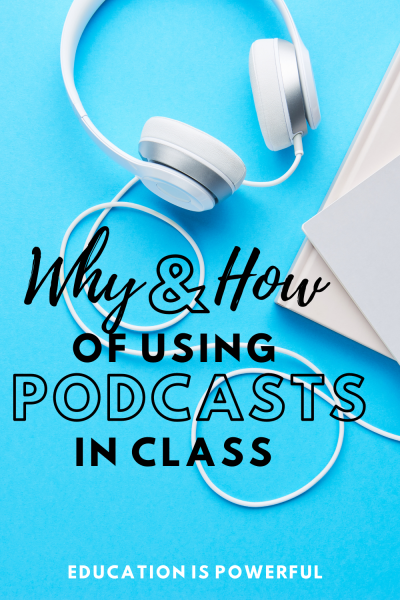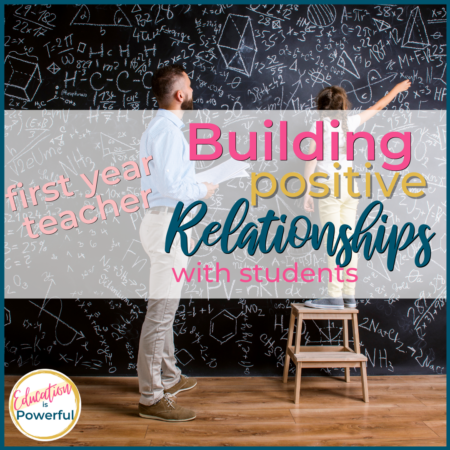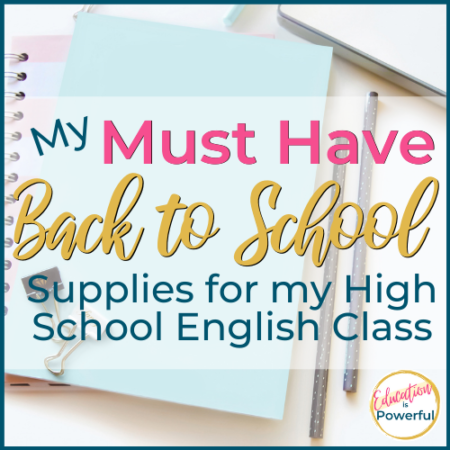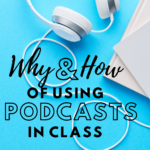Are you using podcasts in class? As of today, there are over 500,000 podcasts on Apple in over 100 languages. It is a resource that we need to be using as English teachers.
Why Should I Use Podcasts in Class?
1. The oldest form of literature was oral histories and stories.
As you may know, I am a mythology teacher. The oldest myths were passed down from generation to generation until one day, someone decided to write it all down. Even the Bible is an oral history from Creation down to Moses – who was the first writer of the Bible.
Narrative thrives on the spoken word. From childhood we start with stories being read to us. And then at one point, even very young children can recite stories that have been read to them over and over. Our first way of experiencing literature was verbal.
Many of the podcasts that read stories or retell stories use professional voice artists, sound effects, and include commentary. One of my new favorites in Nat Geo Kid’s Greeking Out.
Subscribe to my email below and get a free Student Note sheet for the Myth of Arachne from Nat Geo Kid’s Podcast Greeking Out.
2. There are experts out there, teaching, using podcasts.
Did you know that Bill Gates, Anderson Cooper, and Bill Nye all have a podcasts? Not to mention the people that they interview and have on their podcasts are amazing!
We don’t have to know everything and in reality, we can’t know everything. Listening to podcasts is a friendly way to bring in non-fiction and informational texts into our classroom.
And there are so many topics! For example?
I taught Uprising for many years and used the non-fiction book Flesh and Blood So Cheap. While my students like the non-fiction tie in, when I did a search, there are 24 podcast episodes about the Triangle Shirtwaist Factory fire. Everything from the actual fire, to labor unions, to retellings of firsthand account, and the lasting impact. They range from just 7 minutes to over 2 hours.
3. Homework that happens
Let’s face it – we live in a world of multi-tasking. To sit down and read – just read, no music – is almost impossible for most of our students. But with a podcast, students can listen and text their friends, or draw, or do chores (just kidding!).
It is a technology that they already know and can use easily. They can pull it up on their phone, plug in their ear buds, and go.
4. It builds listening and thinking skills.
Do we really listen to each other in our world any more? Sometimes I wonder. By using podcasts in class students get to hear a variety of voices – which helps them stay engaged. Students need to listen for details and facts and learn from what they are hearing.
It also asks them to think – if they are really listening. The way podcasts are structured often lead to the listener thinking about what they think or feel. Even though they aren’t able to answer back, many podcasts hosts actively try to engage their audience.
5. It connects to standards and improves literacy.
I’ll refer you to the experts on this:
Speaking and Listening Standards
The Value of Using Podcasts in Class – The Atlantic
How to Use Podcasts in Class
1. Whole class or Independently
You can play the podcast aloud to your whole class or have student listen independently in class with headphones or at home as homework. I prefer to use them whole class – but that is mostly because I’m a control freak!
2. Treat the podcast like a text
You should do all the things you would do to prepare for reading.
- pre-read (listen) to the podcast – pay attenuation to the vocabulary to make sure that it is appropriate for your students
- plan out places to stop and question – write down the time codes
- plan for the time it will take (with stopping and discussing)
3. Use notes/doodles
This helps students to process the information and practice their listening skills. This can also help to prevent students from getting on their phones. They are accustomed to listening to music and doing just about everything with an earbud in. So, let’s give them something TO DO while listening. I encourage students to use color, draw in the margins, write key words, etc.
- be prepared to walk around while students are listening – monitoring helps students see that this isn’t free time or story time
4. Use podcasts to build background knowledge or spark your lessons
Like I said before, we do not need to be experts in everything.
Recommended Podcasts for Your English Class
Greeking Out – mythology for younger students
The Allusionist – all about words and their meanings
This I Believe – no longer making new episodes, but you still have access to all the old ones
The Dead Robots’ Society – Creative Writing
A Way With Words – examining language through history, culture, and family
Two Book Minimum – Book talks
Plus you can search any topic or person and see what is out there by episode – no need to subscribe to tons of podcasts (like I do!)
**Please preview the podcasts – don’t play anything without listening to it first.




